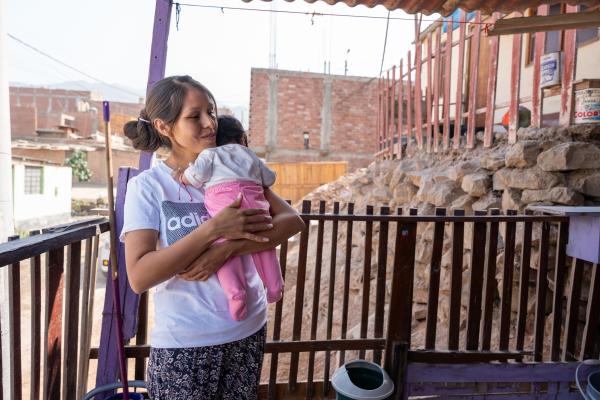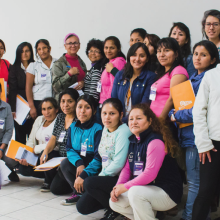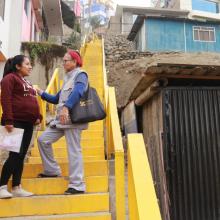depression during pregnancy and after childbirth profoundly affects the lives of women, their children and their communities. In Peru, this problem is more common than is commonly believed: studies by the National Maternal Perinatal Institute estimate that up to 38% of pregnant women show symptoms of depression.
Despite its magnitude, this reality is rarely talked about and even less sustainable community solutions are implemented. It is key to make visible initiatives such as Pensamiento Saludable (PENSA), which for five years has worked with pregnant and postpartum women in northern Lima to reduce symptoms of perinatal depression.
The intervention was developed by the Mental Health Program of Socios En Salud. It is based on an adaptation of cognitive-behavioral therapy, promoted by the World Health Organization (WHO), and is implemented through Community Health Agents (CHAs) and under the supervision of the psychologist.
Between 2018 and 2023, PENSA served more than 430 women. The results, both quantitative and qualitative, demonstrate its effectiveness and the urgency of including similar interventions in maternal mental health public policy.
On the occasion of the International Day of Action for Women’s Health, we address from this experience how a well-designed community intervention can improve the mental health of mothers, strengthen local support networks and reduce persistent inequalities in access to care.
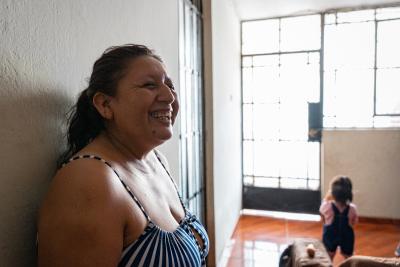
Leidith Tinoco se incorporó a Pensamiento Saludable en plena pandemia de COVID-19. Recibió tratamiento a través de videollamadas y destaca que la comunicación constante con el equipo de Socios En Salud fue clave para su recuperación.
Foto de Diego Díaz / SES
What is perinatal depression and what is its impact on public health?
Perinatal depression encompasses both the pregnancy and postpartum stages. Its symptoms include anxiety, insomnia, isolation, feelings of guilt, disinterest in the baby and even suicidal ideation. It is a problem that not only affects the emotional health of the mother, but also the psychomotor, nutritional development and early bonding with the newborn.
The causes are often linked to social determinants: poverty, spousal violence, lack of family support, a history of mental health problems or unplanned pregnancies. Many women who participated in PENSA reported experiences of abandonment, trauma or overburdening. Some felt a desire to disappear; others failed to breastfeed due to sustained stress.
The public health impact is serious. Without timely treatment, perinatal depression increases risks of obstetric complications, unnecessary hospitalizations, and impaired mother-child bonding. It also implies greater use of health services in the long term, and perpetuates cycles of social exclusion in women who already face multiple forms of structural vulnerability.
Experiences such as PENSA prove that emotional support from the close environment can be effective. Integrating these interventions at the first level of care improves maternal and infant mental health. In addition, it represents a cost-effective and sustainable strategy to respond, from a community approach, to one of the most invisible problems in public health.
On the occasion of International Women’s Health Action Day, we address how a well-designed community intervention can improve maternal mental health.
Results supporting the PENSA intervention
Over five years, the PENSA program has demonstrated strong results. Women with moderate to severe depressive symptoms improved markedly after completing the sessions. In the face-to-face group, depression levels dropped on average from 8 points to just 2 on an assessment scale.
In the virtual modality, the improvement was similar: from 7 to 2 points. This shows that emotional accompaniment can also work at a distance. During the pandemic, many women accessed the sessions from home, without affecting the benefits to their mental health and overall well-being.
In the most recent group of 50 pregnant women seen in 2023, the average dropped from 7.34 to 2.44. This translates into less anxiety, better self-esteem and greater capacity for self-care. Mothers also reported greater confidence in caring for their children and coping with difficult daily situations.
The in-depth interviews and focus groups revealed important learnings. Many mothers identified recurrent negative thoughts and replaced them with ideas of self-affirmation and hope. The intervention made it possible to transform the internal discourse of the participants, which was key to their emotional recovery process and strengthening of the mother-child bond.
Thus, for example, a 43-year-old mother related that an ACS taught her to “change negative thinking to positive thinking,” while another, 39 years old, stated, “Now I see my baby and I feel that together we can overcome everything.”
The ACSs played an essential role. For many mothers, they were their only emotional support: “It was like having a psychologist come to my house, listen to me and advise me,” recounted one participant. Empathy, active listening and constancy were decisive factors for the sessions to have a real and sustained impact.
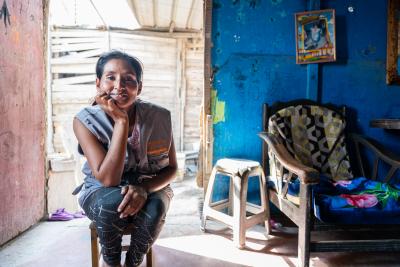
Susana Gamboa, una de las 22 agentes comunitarias capacitadas por el Programa de Salud Mental para la estrategia Pensamiento Saludable.
Foto de Diego Díaz / SES
Community accompaniment adapted to the Peruvian reality
One of PENSA’s great achievements has been to adapt an international tool to a local context. The original program, promoted by WHO and initially developed in Pakistan, was translated and contextualized to work in low-income areas of northern Lima. The sessions were conducted by trained community agents with previous experience.
Each intervention consists of 16 sessions distributed in five modules, from the seventh month of pregnancy to the baby’s first year. During the pandemic, the program was adjusted to short virtual sessions. This flexibility made it possible to maintain accompaniment at a time of high emotional vulnerability for many women in northern Lima.
In addition, the sessions addressed not only mental health, but also self-care practices, respectful parenting and strategies to strengthen the mother-baby bond. Mothers learned to identify difficult emotions, reinforce their self-esteem and establish routines that favored the development of their children, even in contexts of precariousness or loneliness.
Beyond the data, the testimonies show that accompaniment saves lives. The women who participated in SAME’s intervention not only learned to identify their emotions, but also stopped feeling alone. “I would let go and cry and then I felt calmer,” recounted one mother who completed all the sessions.
Others learned breathing techniques, reframed their thoughts or simply found a space to be heard without judgment. These moments of emotional containment were key to regaining confidence and a sense of self-worth. The program offered practical tools that strengthened their emotional well-being in the midst of highly vulnerable situations.
This intervention model breaks with the traditional paradigm of verticalized health care. Here, women are not only patients: they are protagonists in their process of improving their emotional health, accompanied by peers who understand their reality and accompany them. This closeness transforms care into a humane, respectful and dignified experience.
The intervention also empowers the ACS, many of them women from the same community, turning them into agents of social transformation. By providing accompaniment, they provide emotional support and not only strengthen the community fabric, but also find meaning, recognition and self-esteem in their role as caregivers and promoters of mental health.
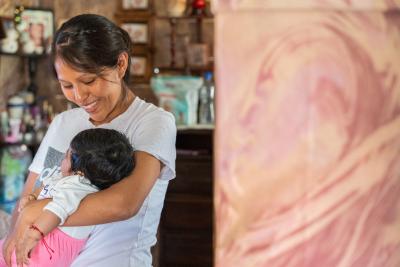
Delia Bruno fue una de las participantes en la iniciativa PENSA del programa de Salud Mental. Ella, como casi un 30% de gestantes de Lima Norte, presentó síntomas de depresión en 2023.
Foto de Diego Diaz / SES
What does this tell us about public policy?
The success of PENSA demonstrates that it is possible to implement maternal mental health solutions that are sustainable, culturally relevant and affordable. To expand the reach of this model, it is key to have the support of public policies that recognize the importance of the approach and ensure its long-term continuity.
Currently, there are no community-based interventions specifically targeting perinatal depression in the health system, which opens up a valuable opportunity for action. Incorporating initiatives such as the one proposed by SAME would close that gap and offer effective emotional support to women who today have nowhere to turn and no one to talk to.
On this International Day of Action for Women’s Health, it is urgent to look at maternal mental health as a priority issue. A mother’s well-being is also that of her child, her family and her community. Taking care of her emotional health is a social investment that can no longer be postponed.
